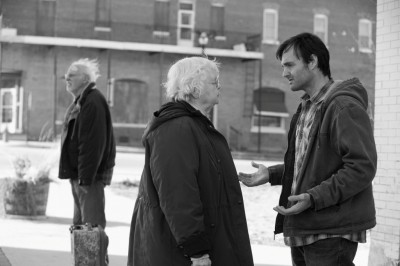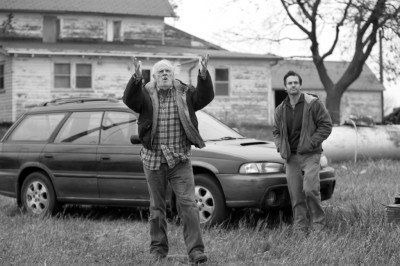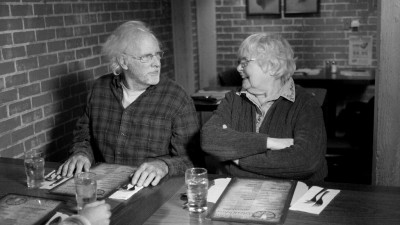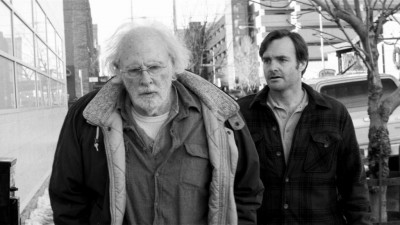
On the one hand, Alexander Payne’s Nebraska is a sweetly sincere movie about a delusional old man on a road trip with his unwilling son to pick up some entirely imaginary sweepstakes winnings. Much of it has to do with how little we often know about our own parents’ youthful pasts. On the other hand, it’s an unflinching look at the decay, stagnation, avarice, small-mindedness and downright meanness of small-town America in decline. I suspect this balancing act is what makes the film work. Either aspect by itself would be too much of a good or bad thing. As Payne and first-time theatrical film screenwriter Bob Nelson present it, it’s an almost perfect blend — sometimes alarmingly bitter, sometimes sadly — and amusingly — sweet.

On the surface, the film is all about Woody Grant (Bruce Dern), an elderly, not-always-genial drunk whose grasp on reality is slipping. He has received one of those come-on adverts that suggests you have won a million dollars. In reality, of course, it’s an attempt to sell magazine subscriptions. But Woody cannot be persuaded that he hasn’t actually won the million. Worse, he refuses to entrust his claim to the mail and insists on making the trip from Billings, Mont., to Lincoln, Neb. — no matter that he no longer has a driver’s license and his old truck hasn’t started in years. He’s even willing to walk to Nebraska — if only the family wouldn’t call the cops on him when he tries. His wife Kate (June Squibb) thinks he ought to be put away. In an act of desperation, his younger son, David (Will Forte), opts to drive him. After all, David’s own life isn’t going all that well and Best Buy can surely do without him for a few days.

Naturally, things do not go well. Woody is hard to control. He tends to get drunk and get into scrapes. Occasionally, he loses his teeth. The idea to stop in Woody’s hometown — the mythical Hawthorne, Neb., — isn’t an especially good one. Woody’s family and old friends are mostly cold, taciturn and slightly ossified. They only come to any kind of life when they learn that Woody has won a million dollars — and their more-lively reactions aren’t pretty. These folks are apparently firm believers in trickle-down economics and they expect Woody’s nonexistent windfall to trickle down on them — by making up nonexistent loans that need to be repaid and other attempts to bamboozle the confused old man. Like Woody, they can’t be convinced that the money isn’t real, and when they do find out, they’re hardly improved.

If this was all of the film, it would just be ugly and it wouldn’t amount to much. Thankfully, as I said, it’s only one side of the story. The other side — where David and his brother, Ross (Bob Odenkirk), learn more about their father than they ever imagined there was to learn (mostly from an old girlfriend of Woody’s and from their outspoken mother who steps in to fill in the blanks and put Woody’s “friends” and family in their places) is another matter altogether. None of this — including a sort of bittersweet, happy ending — erases the nastiness, but it does shrewdly balance it. Shot in often-gorgeous black and white, which gives the decaying small town a stark look, the film is a small gem. It’s a beautifully acted gem, too, especially Dern’s performance as the befuddled (but not entirely gone) Woody. You should see this one. Rated R for some language.
Playing at Fine Arts Theatre.




After the slight misstep with the Descendants i think this might be his best film.
Good Clapton, we agree on something. Must be one of those Christmas miracles I’ve heard about. (I could probably ruin it by noting that I detested Sideways and thought About Schmidt was good but overrated.)
I agree with your rating of Targets i just didn’t comment.
It had just enough good moments to recommend it, but it was a bit long and slow. My posterior was begging for the end for about 15 minutes.
Well, it isn’t fast-paced, but it’s not excessively long, i.e., it’s under two hours.
I was never bored with it, it was a pleasure watching thoughts and memories flit across Dern’s face, telling volumes without saying a word.
As I told you elsewhere, I was surprised by how much more I liked it on a second viewing.